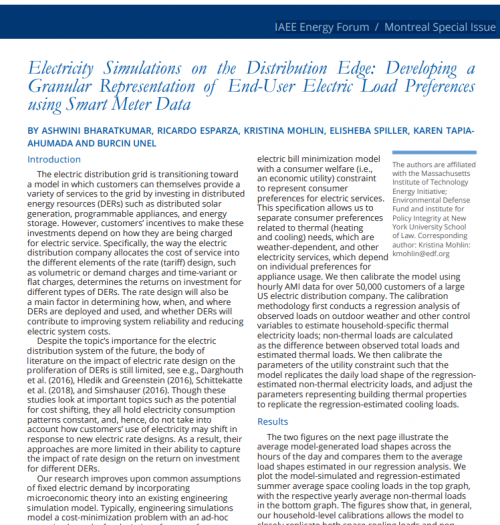-
Electricity Simulations on the Distribution Edge
Developing a Granular Representation of End-User Electric Load Preferences using Smart Meter Data
The electric distribution grid is transitioning toward a model in which customers can themselves provide a variety of services to the grid by investing in distributed energy resources (DERs) such as distributed solar generation, programmable appliances, and energy storage. However, customers’ incentives to make these investments depend on how they are being charged for electric service. Despite the topic’s importance for the electric distribution system of the future, the body of literature on the impact of electric rate design on the proliferation of DERs is still limited. Our research improves upon common assumptions of fixed electric demand by incorporating microeconomic theory into an existing engineering simulation model.
-
Additional Comments to EPA and NHTSA on Vehicle Emissions Standards Economic Analysis
The Environmental Protection Agency (EPA) and the National Highway Traffic Safety Administration (NHTSA) are proposing to weaken key fuel economy and greenhouse gas emissions standards for future vehicle models. In October, we highlighted our concerns with some of the economic analysis supporting the proposal. The Alliance of Automobile Manufacturers submitted comments that included economic analysis supporting the proposed rule prepared by NERA Economic Consulting and Trinity Consultants. In December, we wrote supplemental comments rebutting NERA and Trinity’s analysis, identifying serious flaws and unexplained departures from longstanding practices. NERA recently responded.
Our latest comments detail how NERA’s response does not address many of the problems we previously discussed. As our comments explain, the analysis relies on unreliable modeling and methodologies, for which NERA still has not provided critical details. NERA also misstates or fails to respond to our points on a number of topics, such as scrappage and fuel savings benefits. We point out the shortcomings in NERA’s response and provide more detail on each of the topics.
-
California Incorporates Our Input on Societal Cost Test
California has long been a trendsetter in clean energy policy, and our input helped inform the state’s approach for evaluating distributed energy resources (DERs), such as rooftop solar installations. The state’s new approach, which will quantify the environmental benefits of DERs, could help influence other policies around the country, boosting the growth of clean energy sources. Our comments to the California Public Utilities Commission were heavily cited in a March 2018 administrative law judge ruling that was adopted by the Commission, requiring utilities to conduct a societal cost test to determine the cost-effectiveness of DERs. Having been “persuaded by the arguments of the Institute for Policy Integrity,” the ruling will require utilities to calculate the climate benefits of DERs by using the Social Cost of Carbon estimate developed by the Interagency Working Group. As we suggested further, California utilities will also quantify the air quality impacts of DERs. As a result of this decision, California will be able to create incentives encouraging DER installations that have the greatest benefit to the public.
-
Comments on Changes to Head Start Preschool Requirements
Recently, the Department of Health and Human Services (HHS) proposed to remove from the 2016 Head Start Program Performance Standards a requirement that programs offer full-time, full-year service for every enrolled preschooler. We submitted comments recommending that HHS provide a more transparent justification for the change.
-
Comments to BLM on Lease Sales on Oklahoma and New Mexico
We recently submitted joint comments to the Bureau of Land Management (BLM) about environmental assessments for three planned oil and gas lease sales in Oklahoma and New Mexico. BLM estimates and quantifies some direct, upstream, and downstream greenhouse gas emissions from the leasing plans, but fails to include a monetized estimate or meaningful assessment of the real-world climate damages those emissions will cause.
-
Comments to DOE on Energy Conservation Standards for Small Motors
The Department of Energy called for input on developing and analyzing energy conservation standards for small electric motors. We submitted comments encouraging DOE to account for the monetized climate benefits of greenhouse gas emissions using social cost of carbon estimates.
-
Comments to FERC on PJM Reserve Market Reforms
PJM, the regional organization that manages wholesale electricity and the transmission grid in 13 eastern states, recently proposed a number of changes to its operating reserve market in an effort to improve its pricing mechanism. We submitted comments to the Federal Energy Regulatory Commission (FERC) supporting PJM’s proposal and recommending additional changes.
-
Comments on Georgia’s Electric Utility Resource Plan
Georgia Power Company recently published its 2019 electric utility resource plan, which includes projected future costs of different energy generation programs. We submitted comments asking that Georgia Power more clearly quantify and monetize the greenhouse gas emissions of electricity generation alternatives.
-
Comments on Repeal of Payday Lending Rule
The Consumer Financial Protection Bureau is proposing to repeal a rule that protects borrowers from exploitative payday lending practices. We submitted comments focusing on CFPB’s failure to provide a reasoned explanation for reversing key legal and economic conclusions of the rule.
-
Reply Comments to the FCC on Mitigating Space Debris
The Federal Communications Commission (FCC) called for input on possible market-based approaches to regulating orbital debris, like small but dangerous fragments from the launch, operation, and disintegration of satellites. We previously submitted comments that included an initial discussion of what the FCC might consider in choosing a market-based regulation. Our reply comments expand on this discussion, outlining specific steps the FCC can take to assess implementing a market-based solution.








